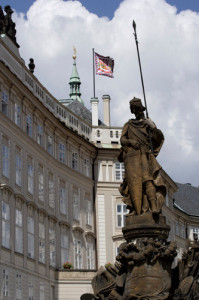Czech republic, elections set for late October.
22 Aug 2013“A general election is likely next month after the Chamber of Deputies voted Aug. 20 to dissolve Parliament, raising the issue of how much influence President Miloš Zeman will wield over the next government.
Lawmakers voted 140 to seven in favor of holding new polls, with the Czech Social Democratic Party (ČSSD), Public Affairs (VV), Communists (KSČM) and TOP 09, along with a number of deputies without a parliamentary party group affiliation, lining up in favor of dissolving Parliament. At least 120 deputies had to agree to dissolve parliament for the vote to succeed. 
With the right-leaning Civic Democratic Party (ODS), which boycotted the vote, languishing in the polls, left-wing lawmakers are likely to be able to form a government after the election, expected on Oct. 25-26.
The Social Democrats are predicted to be the largest party in the lower chamber once the results are in, so any new prime minister will likely be drawn from their ranks.
A key question, according to political analyst Jiří Pehe, the director of New York University Prague and a former adviser to the late former President Václav Havel, is whether Zeman invites the party chairman, Bohuslav Sobotka, to be the head of government.
The selection of Sobotka could reduce Zeman’s influence over the government, since the 41-year-old party chairman is not seen as an ally of the president, who was affiliated with the Social Democrats until 2007…
The influence wielded by Zeman, who took office in March as the Czech Republic’s first directly elected president, has been a key talking point in relation to the government of Jiří Rusnok, whose Cabinet’s recent lost of a vote of confidence in the Chamber of Deputies prompted the dissolution vote.
Zeman’s decision to appoint Rusnok after the government of Petr Nečas fell over a spying and corruption scandal was highly controversial, since Rusnok is a Zeman ally who is not a member of parliament nor affiliated with one of the main parties.
The move, which also saw a string of Zeman allies appointed to the Cabinet, was seen as an attempt by the president to usurp Parliament’s power, even though the Rusnok administration was set to remain in power only for a short period, with elections having to take place next year anyway.
Rusnok resigned as prime minister after his administration lost the Aug. 7 vote of confidence, but the former banker has stayed on in a caretaker role….
Sobotka indicated that, if in power, his party would scale back austerity measures and increase government spending, something the Nečas administration had been predicted to do in any case to boost the economy ahead of what would have been a 2014 election. The Social Democrats, who last held power in 2006, would be likely to increase taxes.
The country has just recorded its first quarter of growth, from April to June, after a record six successive quarters of contraction.”
Full Article – Daniel Bardsley – The Prague Post
- In: Euro-Integration
Comment Form
Welcome
We are a group of long experienced European journalists and intellectuals interested in international politics and culture. We would like to exchange our opinion on new Europe and Russia.
Categories
- Breaking News (11)
- CIS (129)
- Climate (2)
- Energy&Economy (115)
- EU Eastern Dimension (85)
- Euro 2012 – Sochi 2014 – World Cup 2018, Sport (43)
- Euro-Integration (135)
- History Culture (198)
- International Policy (261)
- Military (74)
- Interviews (18)
- Italy – Italia – Suisse (47)
- Odd Enough (10)
- Poland and Baltic States (126)
- Religion (31)
- Russia (421)
- Survey (4)
- Turning points (4)
- Ukraine (176)
- Российские страницы (113)
Archives
- November 2020
- October 2020
- September 2020
- August 2020
- July 2020
- May 2020
- April 2020
- March 2020
- January 2020
- December 2019
- November 2019
- October 2019
- September 2019
- August 2019
- July 2019
- June 2019
- May 2019
- April 2019
- March 2019
- February 2019
- December 2018
- November 2018
- October 2018
- September 2018
- August 2018
- July 2018
- June 2018
- May 2018
- April 2018
- March 2018
- February 2018
- January 2018
- December 2017
- November 2017
- October 2017
- September 2017
- August 2017
- July 2017
- May 2017
- March 2017
- January 2017
- December 2016
- November 2016
- October 2016
- September 2016
- July 2016
- June 2016
- May 2016
- April 2016
- February 2016
- January 2016
- November 2015
- October 2015
- September 2015
- June 2015
- April 2015
- March 2015
- February 2015
- January 2015
- December 2014
- November 2014
- October 2014
- September 2014
- August 2014
- July 2014
- June 2014
- May 2014
- April 2014
- March 2014
- February 2014
- January 2014
- December 2013
- November 2013
- October 2013
- September 2013
- August 2013
- July 2013
- June 2013
- May 2013
- April 2013
- March 2013
- February 2013
- January 2013
- December 2012
- November 2012
- October 2012
- September 2012
- August 2012
- July 2012
- June 2012
- May 2012
- April 2012
- March 2012
- February 2012
- January 2012
- December 2011
- November 2011
- October 2011
- September 2011
- August 2011
- July 2011
- June 2011
- May 2011
- April 2011
- March 2011
- February 2011
- January 2011
- December 2010
- November 2010
- October 2010
- September 2010
- August 2010
- July 2010
- June 2010
- May 2010
- April 2010
- March 2010
- February 2010
- January 2010
- December 2009
- November 2009
- October 2009
- September 2009
- August 2009
Our books




